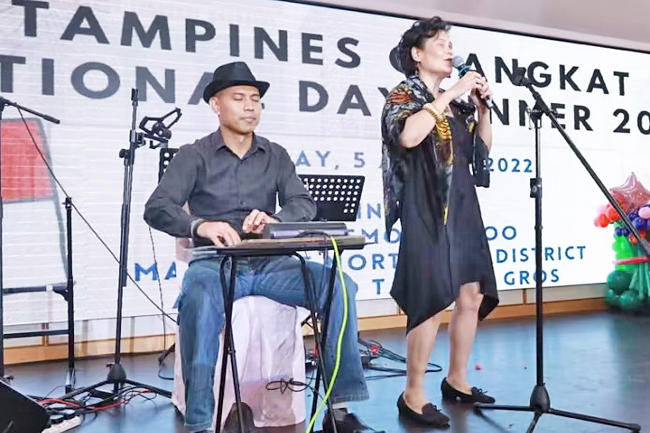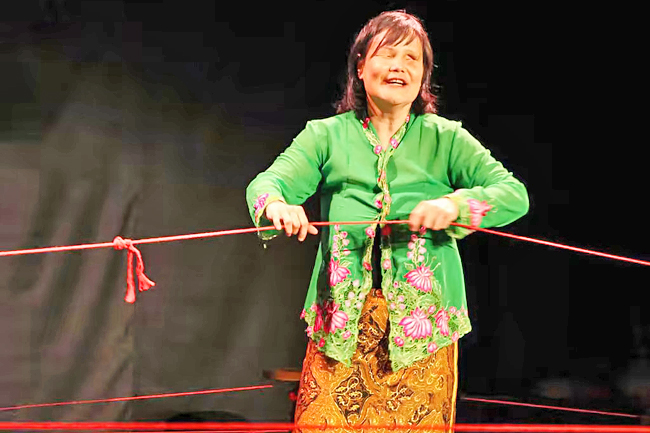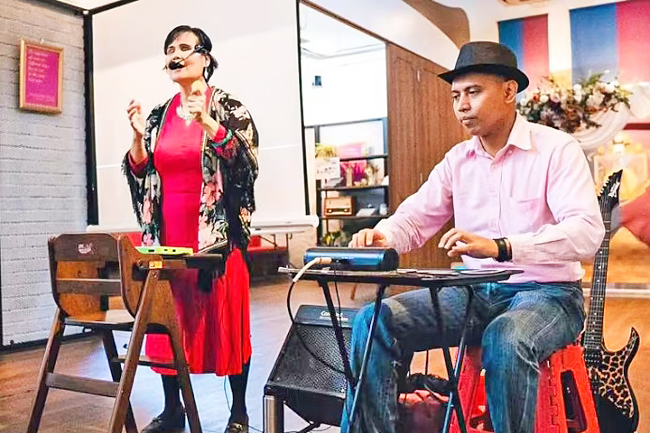Annie Tan
CNA – Wan Wai Yee is a singer for hire. Some days, you may find her belting out Celine Dion or Taylor Swift hits at dinner and dances, weddings and birthday parties. To make ends meet, she also busks on the streets.
This may seem like a typical scenario for many aspiring musicians in our city, some of whom have given up stable jobs and regular pay cheques to perform at gigs with dreams of eventually making it big.
But Wan’s case is distinctively different. She was born blind.
Delivered several months before her due date and weighing around one kilogrammes at birth, she had retinopathy of prematurity (ROP), an eye disease affecting some premature babies.
This caused abnormal blood vessels to grow in the retina, and in Wan’s case, led to total blindness.
Because she could not see, Wan found many doors closed to her as a performer. “Even without listening to you or knowing what you do, people already think, you are blind, what can you do?” she said.
“When I was younger, I wished I were different. I wished I weren’t so blind and that people will look at me some other way,” she admitted.
But the 50-year-old told CNA Women that her musical journey has been life-changing.



FROM THE STREETS TO THE STAGE
“Music has made me confident. It took time to find this confidence and to know what you are about. That doesn’t come overnight. But I’ve learned that you don’t have to please everyone. I can have my own form of art and be accepted,” she said. Although Wan had always loved singing, she did not think she would be a singer. In her late 20s however, she chanced upon a magazine article about a vocal coach in the United States.
Wan felt compelled to seek her out, and began learning classical singing techniques from her. Since those were the days before Skype or Zoom, she painstakingly learned via cassette tapes sent by mail.
This crash course set Wan on a path she never expected she would take. She learnt pop music on her own and with the help of friends, and began performing at events organised by ART:DIS (then known as Very Special Arts), a charity that empowers persons of disabilities through the arts.
In her late 30s, Wan also set up a busking band, StrawberryStory, with a fellow visually impaired musician Ivni Yaakub.
At that time, she was a telephone operator and spent her after-work hours and weekends busking on the streets.
Though it was not the ideal performance venue, her love for singing prevailed. Three to four years later, she took a leap and quit her full-time job to busk and perform at gigs.
“I didn’t find any fulfilment in my full-time work and felt quite trapped. I found more joy in singing,” she explained. “But I was very apprehensive because (as a gig singer), you’ve got to make it work on your own, whereas for a full-time job, you just go to it.”
Fortunately, more opportunities came along, and Wan began performing at restaurants and private events.She performed at The Purple Symphony concerts, an inclusive orchestra made up of musicians with and without disabilities.
She also landed roles in three musicals, including My Love Is Blind which ran in 2017 and was based on the life story of a blind businessman and advocate for the blind Tan Guan Heng. Any Singaporean who tells family and friends that they want to quit their job to be a gig performer is bound to come up against some naysayers. In Wan’s case, she faced even more discouragement because of her blindness.
FIGHTING FOR HER BELIEF
“When I told people of my plan, they said I would be better off staying put and that it might be more difficult for me because I could not see. They were worried things would not happen for me,” she said.
These beliefs reflected general stereotypes in society and were self-fulfilling, said Wan.
“There is a misconception about what blind people can do and cannot do, so once people think this cannot be done, there is no room to open up the conversation,” she explained.
She recalled a time her friend tried to introduce her to a producer for a project, but she was flat out rejected without even a meeting because of her blindness.
She also recalled hearing others gossiping behind her back that she would not be able to sing well because she was blind.
“When you get too many rejections, you can’t help but wonder why you can’t be given a chance. You wonder if you are not good enough,” she said.
“I felt pretty beat up,” she admitted. “But then I said to myself, ‘Come on! Are you just going to hold onto the opinion of one person? Even if it’s right, get off your bum and improve yourself.” And that is what Wan did.
In 2019, she underwent her first vocal examination in Musical Theatre Grade Five by the London College of Music, and earned a distinction.
She also performs with a contemporary acappella group and pop choir TAS Voices, strengthens her vocal techniques under a scholarship from the Purple Symphony Award Training Programme and is learning to act with ART:DIS. Today, Wan fully embraces her unique journey and blindness. “I’m myself. My experiences are what I am. Although what I know might be the ‘blind way’, it brings different perspectives to the table,” she said.
However, she sometimes hopes that audiences can look beyond her physical condition when appreciating her performance.
NOT DEFINED BY HER BLINDNESS
“I don’t want to be seen just as a ‘blind singer’. I want to be seen as a ‘singer’,” she stressed. “I want to be seen as myself, an individual.”
“I don’t want the audience to pity me and say, ‘Oh, poor thing, let’s give her a chance’,” she added. “If I’m not good, just say I’m not good, go away. I can take it.”
That is why Wan is constantly working to improve herself.
“I want to set a higher standard for myself and not just give in to the charity models out there,” she said.
She explained that some people have the mentality that persons with disabilities do not need to hone their art because they are just doing charity shows.
“For me and some others like myself, we want more. We want to do the best we can and maybe even be better than others. I think we need to work harder because we cannot see or hear. We need to up our standard,” she added.
All Wan asks is for the same training and auditioning opportunities as sighted people.
“I hope that someday, I will be able to sign up for a class such as a dance class, and people will say, sure, what kind of support do you need? Let’s do it in a way that works you too,” she said.
“Don’t think I can’t do it because I am blind. I believe that if I’m trained properly, if anybody is trained properly, we can do it,” she added.


